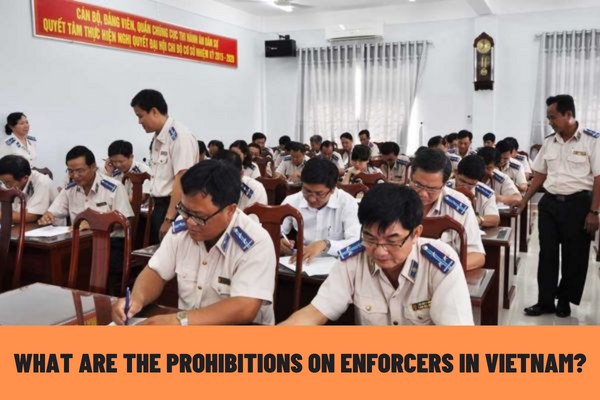What are the prohibitions on enforcers in Vietnam? What are the tasks and powers of enforcers in Vietnam?
What are the prohibitions on enforcers in Vietnam?
In Article 21 of the 2008 Law on Enforcement of Civil Judgments in Vietnam, the prohibitions on enforcers include:
- Prohibitions on civil servants as prescribed by law.
- Providing advice to involved parties and persons with related interests and obligations, leading to unlawful judgment enforcement.
- Illegally intervening in the handling of cases subject to judgment enforcement or abusing one’s influence to affect persons responsible for judgment enforcement.
- Illegally using material evidence, money and assets involved in judgment enforcement.
- Enforcing judgments related to their own rights and interests and those of the following persons:
+ Their spouses, blood children or adopted children;
+ Their blood parents, adoptive parents, paternal or maternal grandparents, uncles, aunts, and blood siblings or those of their spouses;
+ Nephews and nieces whose blood parents are their blood siblings.
- Using their enforcer cards, uniforms and badges or support tools in conducting activities beyond their assigned tasks and vested powers.
- Harassing or troubling individuals, agencies or organizations in the course of judgment enforcement.
- Intentionally enforcing judgments or rulings in violation of their contents; delaying or prolonging the enforcement of judgments assigned to them without adequate legal grounds.

What are the prohibitions on enforcers in Vietnam? What are the tasks and powers of enforcers in Vietnam? (Image from the Internet)
What are the tasks and powers of enforcers in Vietnam?
In Article 20 of the 2008 Law on Enforcement of Civil Judgments in Vietnam, the tasks and powers of enforcers include:
- To promptly organize the enforcement of judgments or rulings assigned to them; to issue judgment enforcement decisions according to their competence.
- To strictly enforce contents of judgments or rulings; to correctly apply legal provisions on the order of and procedures for judgment enforcement, ensuring the interests of the State and the rights and legitimate interests of involved parties and persons with related interests and obligations; and to strictly observe regulations on standard professional ethics of enforcers.
- To summon involved parties and persons with related interests and obligations for judgment enforcement.
- To verify assets and judgment execution conditions of judgment debtors; to request concerned agencies, organizations and individuals to supply documents for the verification of addresses and assets of judgment debtors or coordinate with concerned agencies in handling material evidence, assets and other matters related to judgment enforcement.
- To decide on the application of measures to secure judgment enforcement and coercive measures to enforce judgments; to work out plans on coercive judgment enforcement; and to confiscate assets for judgment enforcement.
- To request under law police offices to detain persons resisting the judgment enforcement.
- To make written records of violations of the law on judgment enforcement; to impose administrative sanctions according to their competence; to propose competent agencies to discipline or administratively sanction violators or examine violators for penal liability.
- To decide on the application of coercive measures to recover money and assets already paid to involved parties in contravention of law, collect judgment enforcement charges and other amounts payable by involved parties.
- To use support tools while on duty under the Governments regulations.
- To perform other tasks assigned by heads of judgment enforcement agencies.
When performing their tasks or exercising their powers, enforcers shall comply with law and take responsibility before law for judgment enforcement and have their lives, health, honor, dignity and prestige protected by law.
What are the cases of relief on duty of enforcers in Vietnam?
An enforcer is relieved from duty in the cases specified in Article 19 of the 2008 Law on Enforcement of Civil Judgments in Vietnam, specifically as follows:
Relief from duty of enforcers
1. Enforcers will be automatically relieved from duty in case they retire or are transferred to other agencies.
2. The Justice Minister shall consider and decide on relief from duty of enforcers in the following cases:
a/ They are unable to fulfill their tasks due to family circumstances or poor health;
b/ Their professional qualifications and capacity are insufficient for fulfilling their tasks or they no longer satisfy the criteria for enforcers for other reasons.
3. The Government shall specify the order of and procedures for relief from duty of enforcers.
Thus, enforcers may be relieved from duty in the following cases:
- Enforcers will be automatically relieved from duty in case they retire or are transferred to other agencies.
- The Justice Minister shall consider and decide on relief from duty of enforcers in the following cases:
+ They are unable to fulfill their tasks due to family circumstances or poor health;
+ Their professional qualifications and capacity are insufficient for fulfilling their tasks or they no longer satisfy the criteria for enforcers for other reasons.
LawNet